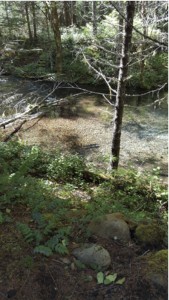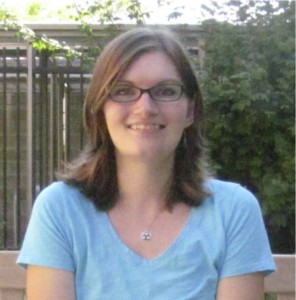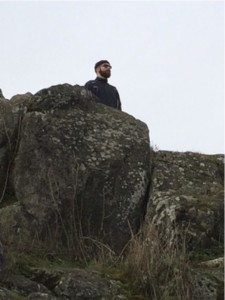By Ashley Adelman
Traveling up Highway 126 in late September, many thoughts went through my head as I gazed upon the McKenzie River. Will there be salmon this year? Has this summer’s drought impacted the population? I’m so excited to get outside and chat with seventh graders about salmon and their habitat! As we arrived at the Carmen-Smith Spawning Channel, I was beyond excited to explore the landscape and perhaps share some knowledge about the life cycle of these spectacular anadromous fish. Just a few weeks into my RARE AmeriCorps position and I was already out in the field, gaining insight on education programs offered by McKenzie Watershed Council.

Throughout the day, students rotated around four stations focusing on water quality, ecology, macroinvertebrates, and fish biology. Volunteer educators shared facts and insights on the topics as the students engaged in hands-on activities such as measuring turbidity and pH, identifying macroinvertebrates, and plant identification. The students were so engaged and excited to be learning outdoors!
We spotted over 50 Chinook salmon in the channel during the field trip! Quite a feat considering these salmon made a 300 mile journey from the Pacific Ocean to the channel as they reached the end of their life cycle. Right about now, the last of these new eggs are hatching and the cycle is beginning again. This threatened species continues to survive despite human impacts from dams and habitat alterations.
As I look back on the last four months of service, this field trip comes to mind as it was a truly phenomenal start to my year of service. Not only did I have the opportunity to explore the beautiful McKenzie River, I met many of the seventh grade students in the McKenzie School District. The students remember me from Salmon Watch and they greet me in the halls with a smile. These thoughtful hellos continue to inspire my projects.
When I reach out to community partners to develop a strategic plan for expanding programs such as Salmon Watch, I think of these students and the positive impact these outdoor experiences have in their education.

Ashley received her bachelor of science in Planning, Public Policy and Management and in Environmental Studies with a minor in Geography from the University of Oregon. As a student, Ashley worked as a student advisor for the Environmental Studies program, assisting current and prospective students with planning their degrees and helping the program identify new courses suitable for major curriculum. Ashley also interned with Schoolhouse Garden, where she promoted the program, led and co-led service projects, and wrote grants to secure $15,000 of funds. During her year with RARE AmeriCorps – Resource Assistance for Rural Environments, Ashley hopes to utilize the knowledge she has gained throughout her education and to enhance community connections to the outdoors, especially for children. Following her year with RARE, Ashley plans to obtain her permaculture design certificate while improving her Spanish language skills, and she would eventually like to own and operate a sustainability education center for long- and short-term guests.
